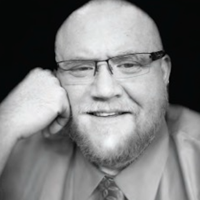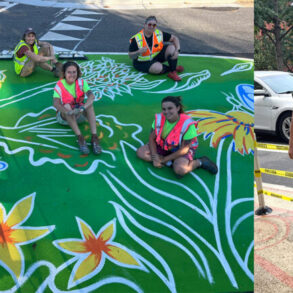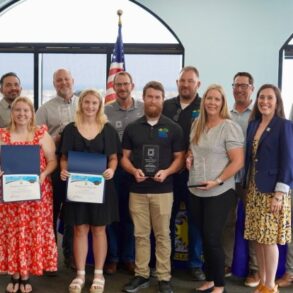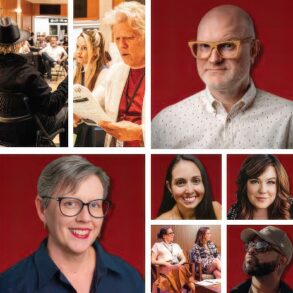
Krueger’s deep connection to antiques began in his childhood. “Growing up, my parents owned several antique stores, which sparked my career interest,” Krueger shared. His grandfather, a watchmaker and jeweler, also played a crucial role in shaping his path.
As a child, Krueger had to polish silver, glassware, china, and pottery in his parents’ stores whenever he brought home poor grades. “I really resented it at the time, but what I didn’t realize is I was getting a ‘PhD’ in valuables and antiquities,” Krueger said.
His passion for coins began when he was eight years old. “My step-grandfather had cancer at the time and lost a bunch of weight, and he lost his Masonic ring somewhere out in the yard,” Krueger said. “He went down to the local electronics store in 1982 and bought a metal detector and struggled with it. Frustrated, he handed it to me, saying, ‘Figure this out.’”
Krueger started metal detecting in the yard. After finding numerous old beer-can pull-tabs, he discovered his first coin: an 1832 large cent.
Large cents were a type of American penny minted from 1793 to 1857 and finding one from 1832 was significant. For an eight-year-old, finding a 150-year-old coin was thrilling and cemented his interest. Krueger shared, “I was an instant millionaire and an instant archaeologist in my mind, and I’ve been metal detecting ever since.”
Krueger’s business partner, Bobby Enright, shared insights about their working relationship and history. They met when Krueger attended a corporate training session led by Enright around 2010. Based in Ohio, Enright plays a significant role in the business’s administrative aspects.
When asked about memorable antiques, Enright mentioned, “The most intriguing item I’ve encountered in this business was a rather rare Gibson guitar. It was something I’d never seen before.”
Enright mentioned that they frequently encounter war memorabilia, often accompanied by incredible stories. “Hearing how a customer acquired these items — whether they were actually at war or received them as gifts — is always fascinating,” he said. One of the more unusual items he has seen was Johnny Cash’s bed, authenticated by Cash’s secretary. He noted that there are always remarkable finds in this treasure hunt, and it’s astonishing how new surprises continue to emerge. Enright added, “Just when you think you’ve seen it all, something new appears at the next show.”
In the past, when Krueger worked for a now-defunct company, they bought unusual items like an electric chair from Sing Sing Prison.
At one point in his career, Krueger worked for a traveling roadshow that did appraisals but didn’t buy items, which left people needing money. He said, People would get the appraisal, but then no one would offer them money, and some of these people needed money. This disconnect inspired him to join a company which bought items directly from people.
By selling directly to him, people receive more money and get paid immediately, instead of consigning their items, paying a 45% fee, and waiting up to three months for the auction. This arrangement is more beneficial for the client, as the items might not sell for the desired price at auction.
“Gold is now at the highest it’s ever been. It’s hit $2,400 per ounce,” he noted, highlighting the economic challenges driving people to sell their valuables.
Emphasizing his ethical approach, Krueger explained, “I try to hold the high ground… This is my livelihood.” He noted that maintaining control and ethics in his business helps avoid issues with the Texas Department of License and Regulation.
GOOSEBUMPS
One of Krueger’s most memorable experiences involving valuable items centered around a man named Clarence.
While doing a show in Knoxville, Tennessee, Krueger recalls getting goosebumps as he tells the story. Having just finished his paperwork from a previous client, he was approached by a gentleman who dropped four coins onto the table. Krueger was facing away, so he glanced back and asked, “What do you have there, old timer?” The man replied that he thought the silver’s value was around $120.
Krueger assumed the coins were just some ungraded silver eagles, considering silver was about $30 an ounce. But when he turned around, he nearly choked — he was looking at four 1794 flowing hair silver dollars, of which only about 1,758 were minted. With only 20 or 30 still known to exist, Krueger initially suspected these might be counterfeit.
Using his scale, micrometer, metal authenticator, coin authenticator, and microscope, Krueger began to verify their authenticity.
The coins were authentic.
GETTING TO KNOW THE MAN
At 93 years old, Clarence had recently had to place his wife of 62 years into a nursing home. Krueger explained that if one isn’t independently wealthy in Tennessee, the state can claim assets like retirement funds to cover long-term medical care. Furthermore, a recent hailstorm had left Clarence needing $4,800 for a roof deductible.
While continuing to authenticate the coins, Krueger gathered more information about Clarence. “And come to find out, he served in World War II in the 4th Marine Division on Iwo Jima. My grandfather was in the 4th Marine Division and fought on Iwo Jima. And so, now I’m, like, bound to this man — and I want to be absolutely as fair as I can to him.”
Given that the last auction for coins like those Clarence presented had occurred nine years prior with no recent comps available, Krueger decided to seek help from a prominent auction house. After discussing the situation with a contact there, Krueger determined a fair price.
“I told Clarence, ‘I’m going to give you a number for these four coins. If you had taken them to a pawn shop or coin shop and said you thought they were worth $120 total, they likely would have given you that amount, and you wouldn’t have known any better.’
“I continued, ‘But for these four coins, I’m going to offer you… Please take a deep breath and try to stay calm. It would ruin my week if you get too excited and have a heart attack right here. So, for these coins, which you thought were worth $120, I’m offering you $56,000.’
“Clarence leaped across the table and embraced me, his tears streaming down my neck as he hugged me and trembled. I helped him back into his chair and said, ‘Clarence, please take a deep breath and stay calm. I’m giving you $56,000 per coin.’
“He was overwhelmed. Clarence’s lip quivered, tears flowed freely, and he rocked back and forth in his chair. It took him about 45 minutes to compose himself entirely.”
Humorous Incidents and Rare Finds
Not all encounters are as profound. Krueger recalled humorous incidents, including a woman trying to sell what she claimed was Elvis Presley’s fecal matter.
“She came in with a box of flatware and a shoebox, saying her great-grandmother had passed away, and all six granddaughters received a sterling silver set. However, when I checked, it turned out to be stainless steel from Oneida, not sterling silver. So, I punched it up on my laptop. I was like, ‘Look, I can buy this set at Walmart for $18.87. And that’s rollback pricing.'”
She exclaimed, “You’re a charlatan!”
“I’m someone who has spent the last 42 years of his life in antiquities and precious metals,” Krueger responded.
He continued, “Upset, she pulled out the shoebox, saying, ‘You’ve never seen anything like this before.’ And I said, ‘Okay.’ And I opened it up, and it just looked like a twig—a little round piece of twig that she claimed was Elvis’s fecal matter. When I asked how she obtained it, she revealed, ‘On August 19, 1971, I had a one-night stand with the King.'”
He humorously recounted how he dealt with the situation, maintaining professionalism despite the absurdity.
“I try and hold the high ground and aim to be as fair as possible because I have a reputation to uphold,” Krueger said.
This philosophy extends to his diverse acquisitions, which range from coins to Lalique crystal vases to African mahogany busts and costume jewelry. However, National Collectors Estate Buyers Guild avoids large items like furniture because they are difficult to ship and don’t sell well at auction.
INSIGHTS AND UPCOMING EVENTS
Enright shared insights into the industry. “We see trends based on age groups, especially baby boomers retiring and selling their collections,” he said, noting the importance of adapting marketing strategies to modern platforms like social media.
Krueger stressed the importance of building rapport with clients, contrasting his approach with that of less personable competitors. He understands the emotional and financial motivations behind selling heirlooms and investments, necessitating empathetic and genuine communication.
“You have to talk with people. You can’t just talk at them,” he noted, emphasizing that trust and likability are crucial in his business.
“The Guild sets up buying events in different cities, starting in Texas with plans to expand to Florida and New England. It’s so much fun dealing with colonial coins in New England,” said Krueger.
This post was originally published on this site be sure to check out more of their content







